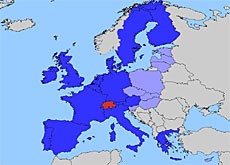
EU enlargement deepens Swiss isolation

After a decade of debate, the European Union has opened the door to ten new members by 2004 - again casting the spotlight on Switzerland's isolation.
Nevertheless, the Swiss government and business have welcomed the EU decision, seeing it as opening new avenues for Swiss businesses.
“The well-established political and economic conditions set between Switzerland and the EU can now be expanded to new markets,” was the Swiss economics ministry’s response.
All of Switzerland’s bilateral agreements – mainly on trade – will apply to the new member states, with the one exception of the deal on the free movement of people, which will need to be renegotiated after the new members join.
By expanding into what are mostly ex-communist countries – such as Estonia, Hungary, Latvia, Poland and Slovakia – the EU is expected to add some 75 million people to its existing population of 400 million.
And because EU laws, and market conditions, will hold sway in the new members states, Switzerland will have fresh trading opportunities – even though it is not a member of the union.
Chasing the ex-communist consumer
Swiss business groups, particularly those representing small and middle-sized firms, have already begun building links to countries such as Lithuania, Slovenia, Hungary and Poland.
Marcel Ledergerber, head of Swiss Export, was very upbeat about the Commission’s announcement. “East Europe is a giant market with millions of potential customers,” Ledergerber told swissinfo.
However, Ledergerber warns that many Swiss firms have still to grasp the coming opportunities – pointing out that many German firms, unlike their Swiss competitors, have long been active in Eastern Europe.
For an export-dependent country such as Switzerland, the EU’s new members may be essential for its long-term prosperity. Every tenth small or middle-sized Swiss firm is reliant on exports – much of them to Europe.
Political isolation
The European Commission’s recommendation for expansion – which still faces several key hurdles, including a referendum in Ireland and in several of the applicant states – also highlights Switzerland’s increasing political isolation.
The country is now the member of one of Europe’s most exclusive clubs – that of non-EU states – which by 2004 will count among its biggest members Bulgaria, Romania and Turkey.
Curt Gasteyger, professor-emeritus of the Graduate Institute of International Studies in Geneva, says Switzerland’s growing isolation is a factor that will not diminish with time.
“The blind spot, politically, in the centre of Europe will be Switzerland… and that must certainly have an effect on both Switzerland’s European position, as well as on the Swiss perception of Switzerland’s role in the new Europe,” Gasteyger told swissinfo.
Not defensible
Gasteyger also argues that Switzerland’s future isolation within the EU will not be defensible through claims of its economic superiority.
As recently as March 2001, the Swiss voted against even opening talks on joining the EU – partly because of fears that the country’s relative wealth could be siphoned off by the needs of Europe’s poorer member states.
“Let us face it, Switzerland today is in a much weaker position economically and financially than it was several years ago, when it proudly could say – ‘we are the strongest, we are one of the best run countries therefore we don’t need the EU’,” Gasteyger says.
“That is no longer the case. We have seen, last year and this year, serious shocks and setbacks when it comes to Swiss economy.
“So perhaps we will become somewhat more modest when it comes to our relationship with the EU.”
swissinfo
By 2004 the following countries are expected to join the EU: Cyprus, the Czech Republic, Estonia, Hungary, Latvia, Lithuania, Malta, Poland, Slovakia and Slovenia.
By 2007: Bulgaria and Romania.
Turkey: no timetable for accession.
Enlargement will boost the population by 20% to some 475 million.
But the increase in GDP will be just 5%.
The EU’s land area will increase by 30%.

In compliance with the JTI standards
More: SWI swissinfo.ch certified by the Journalism Trust Initiative





























You can find an overview of ongoing debates with our journalists here . Please join us!
If you want to start a conversation about a topic raised in this article or want to report factual errors, email us at english@swissinfo.ch.